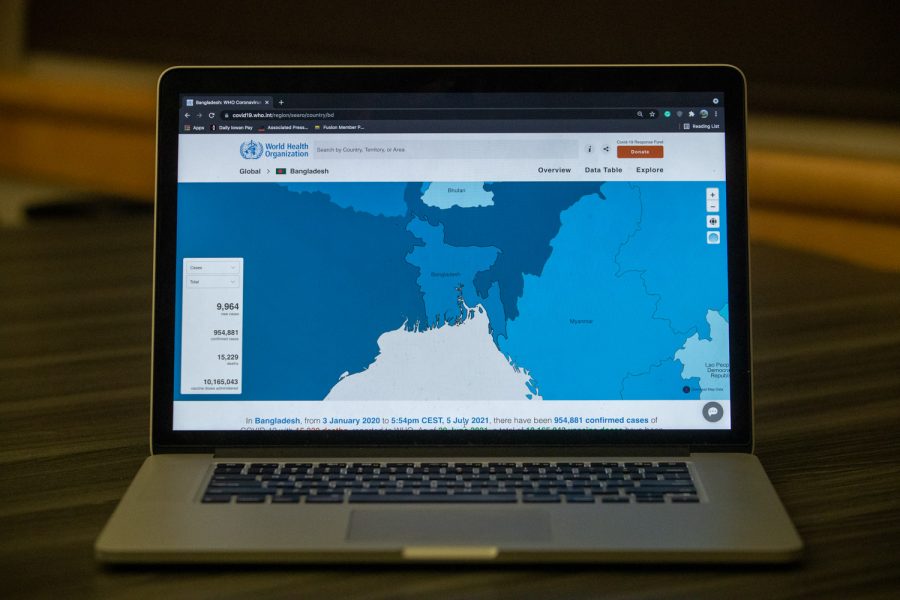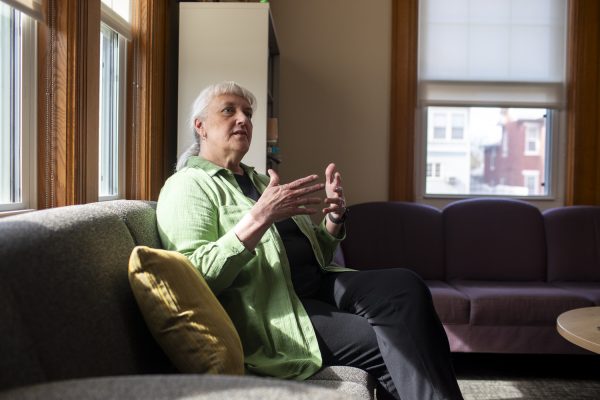UI Bangladeshi grad students worry about their families as COVID cases rise in Bangladesh
UI Bangladeshi grad students talk about their fears for their families currently living in Bangladesh where COVID cases are rising.
Covid cases for Bangladesh are displayed on the World Health Organization website on Monday, July 5, 2021.
July 5, 2021
The COVID-19 pandemic may feel like a thing of the past for some vaccinated students in the U.S., but international students still live in fear for their overseas families.
Redwan Bin Abdul Baten is a graduate student at the College of Public Health living in Iowa City with his wife and children, but he worries for his family still in his home country of Bangladesh.
“The health care system in [Bangladesh] was not resilient enough, was not strong enough, to absorb this kind of a shock like a global pandemic,” said Bin Abdul Baten, president of the UI Bangladeshi Student Association.
Bangladesh has recently gone through a record spike in COVID-19 cases, with more than eight thousand positive cases confirmed on July 4 alone. Bangladeshi hospitals are scrambling to treat patients and lockdowns set by the government have been less than successful. Because of this, the Bangladeshi international students have been unable to go home or see their families in over a year.
“We’ve had a couple of deaths in the family that were resulting from COVID. So overall it was a scary situation because I wasn’t there and my parents were severely exposed to COVID,” Bin Abdul Baten said.
Fahim Zamen is a Ph.D candidate for electrical and computer engineering at the University of Iowa currently living in Iowa City, but his family and fiancé are still in Bangladesh. Zamen was supposed to get married in April 2020, but because of COVID the wedding has been pushed back with no telling when they can safely have a wedding with their families.
“Most [international students] have the same situation as me,” Zamen said.
RELATED: International travel to resume following pre-pandemic guidelines for faculty and staff
Because of COVID travel restrictions, many international students have been unable to go back to their home countries.
“The university was pretty compassionate about everything, even my supervisors and everyone mentally supported us, that’s really helpful,” Zamen said
There are student organizations dedicated to helping UI international students, such as the Organization for the Active Support of International Students (OASIS), which is “a University of Iowa student organization, which gives voice to the rich diversity of international students present on the UI campus,” according to the International Programs list of support for international students.
“The UI is committed to enriching the global experience of students, faculty, staff, and the greater community,” says the UI International Programs website.
The ISSS webpage has an updated list of information for international students regarding immigration laws, COVID vaccine information, and CDC travel guidelines.
Bin Abdul Baten said that international students already have to leave behind their entire lives when they go abroad for their education, but being unable to see their families who live in places with rising COVID cases makes their situation much more stressful and terrifying.















